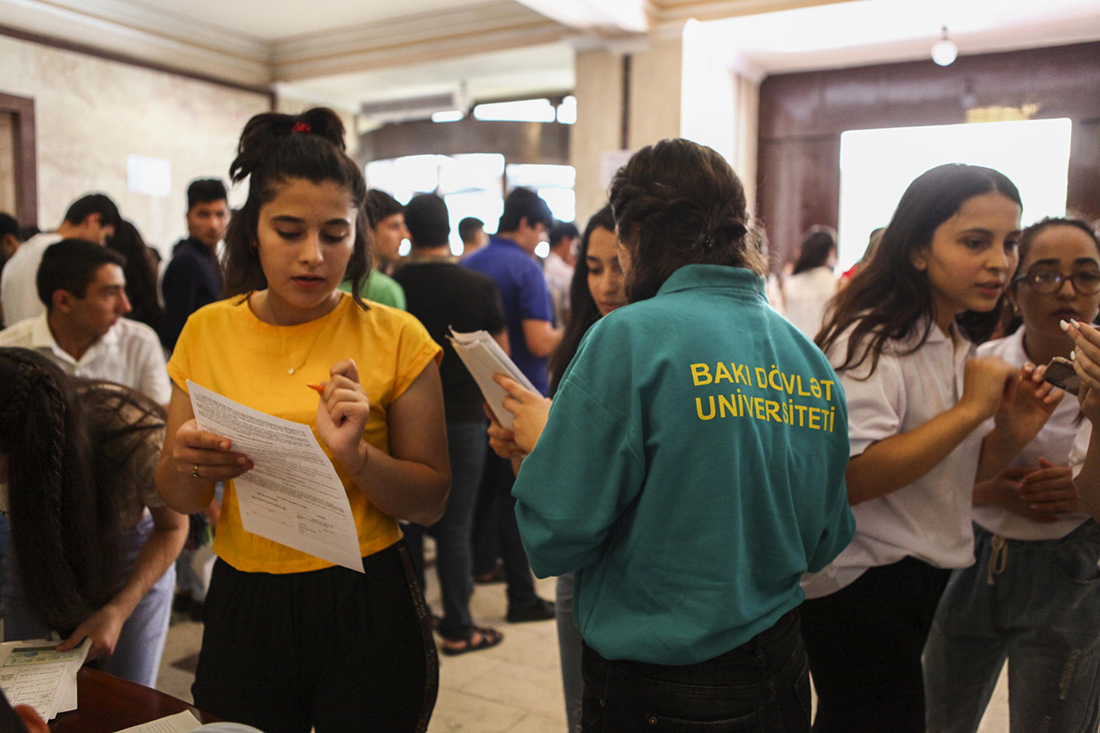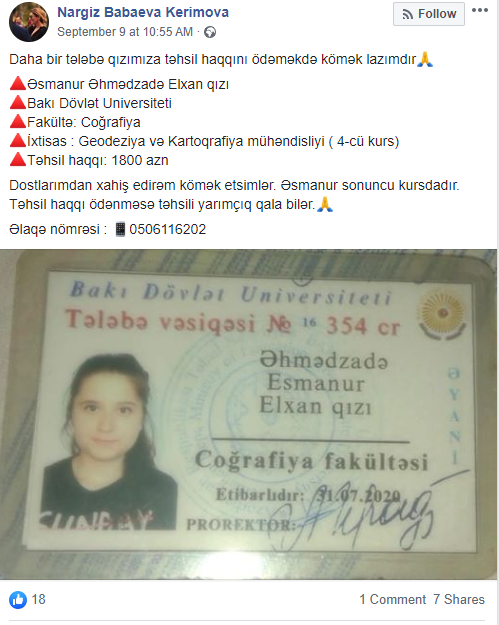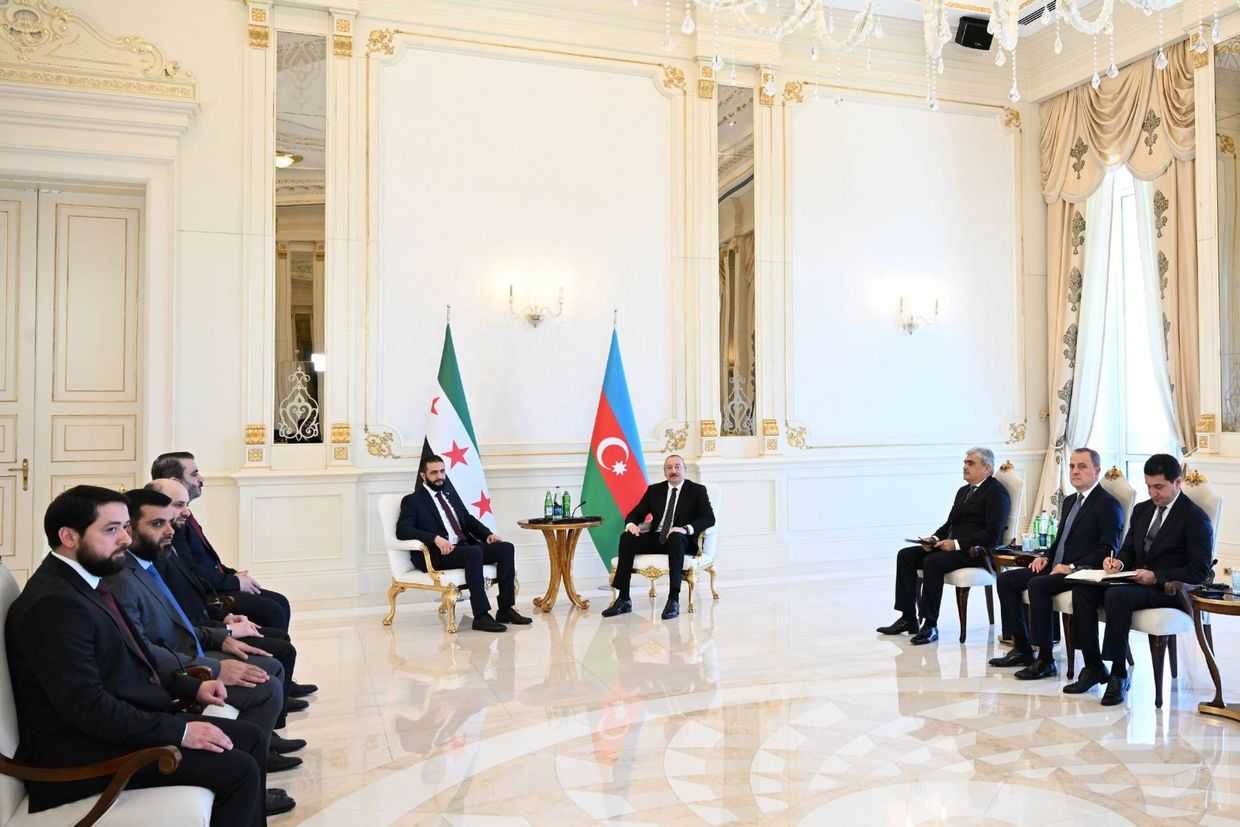

With some of the highest tuition fees in the region but low performance, critics say Azerbaijan’s education system doesn’t make the grade.
Umman Safarov will not be returning to university this September. He could not continue his studies at the Faculty of Journalism at Baku State University (BSU) because he could not afford the tuition.
‘I had to pay for my degree, but I didn’t have enough [money]. Maybe I’ll finish it someday.’ Safarov tells OC Media. ‘It is nothing but a waste of time for me to study in Azerbaijan, especially at BSU. It was easy to decide [to leave school]. If you have no money, you have no choice.’
Safarov is one of thousands of Azerbaijani students who have dropped out of university for financial reasons in recent years.
Every year, just as the admissions period is coming to an end, Azerbaijani social networks are flooded with posts from prospective students asking for aid from friends, relatives, and the wider public in paying their tuition fees.

According to the State Examination Centre, for the 2019/2020 academic year, 42,000 people have been admitted to higher education institutions. Of these, 18,000 are eligible for tuition subsidies from the government while 24,000 must pay out-of-pocket.
Tuition fees in Azerbaijani universities start at ₼1,000 ($590) per year and can cost up to ₼6,500 ($3,800); almost double that of many other countries in the region.
Systemic problems
About 160,000 students are currently enrolled in 54 universities in Azerbaijan. Of that number, 70% pay out of pocket, while the remaining 30% are paid for out of the state budget.
Kamran Asadov, the head of the Educational Services Research and Analysis Centre, a Baku-based NGO, says that tuition fees in Azerbaijani universities are higher than in much of the rest of the world, especially countries at a similar level of economic development. Meanwhile, the quality of education in Azerbaijani Universities is often not up to par — not a single Azerbaijani University has broken into the Times World University Rankings list.
The Azerbaijani government only currently covers tuition fees of certain subjects. They also cover the costs for categories of students, primarily those from disadvantaged backgrounds, including people with disabilities, or the children of citizens who have been recognised as ‘National Heroes’ of Azerbaijan.
Asadov says that over the past five years, more than 7,000 students have been denied an education because of their inability to pay for tuition.
According to him, one of the greatest barriers university students in Azerbaijan face is the lack of state-backed loans.
‘There are no concessional loans to students in Azerbaijan’, he says. ‘The one educational fund is the “Maarifchi” (Educator) Loan Student Fund, but it is private and has no budget.’
In August, the fund told local media that they had so far cooperated with 15 universities and signed 247 educational loan agreements with students. This was far fewer than the number of students who are expected to drop out of university this year because of their inability to afford tuition.
Asadov says that despite the high tuition fees, universities do not try to alleviate students’ precarious economic conditions.
‘Unfortunately, in Azerbaijan, more than 160,000 students studying at 54 universities do not receive any discount. Whereas around the world it is common practice for students to receive discounts on transportation, clothing, restaurants, and bookstores.’
‘Even the dormitories are sometimes discounted’, he added.
Asadov says that the approach taken by universities in Azerbaijan towards tuition rates is wrong.
‘[Tuition is based on] teachers’ salaries for all subjects taught during the year’, Asadov says. ‘[It] also includes the costs associated with the maintenance of the university.’
Asadov says that when determining tuition fees, both the government and universities should take into account not only the costs but also the salaries graduates will earn when they enter the labour market.
‘Unfortunately, it takes up to 10 years with current salaries to earn tuition fees that students pay for their studies’, Asadov says.
As a result, he says, there are many vacancies in Azerbaijani universities, and programmes with fewer students are forced to raise tuition fees. This triggers a vicious cycle as the higher fees push even more young people to turn to universities abroad, thereby creating even more vacancies.
‘In [Azerbaijani] universities there are many vacancies because Azerbaijani youth can get a higher education in neighbouring countries and pay less tuition. Right now, we are creating the conditions for a large number of people to [get their education] abroad.’
Political Debates
Natig Jafarli, the executive secretary of the opposition ReAl Party, launched a signature campaign for a free higher education bill on November 2018.
By Azerbaijani law, If the petition gathered more than 40,000 signatures, it would be brought to the national legislature for consideration.
The petition was presented to the Central Election Commission (CEC) for review but was denied. The CEC alleged that a number of signatures on the petition were not genuine and as a result there were not enough signatures to cross the threshold of 40,000.
Jafarli, nevertheless, considers the petition a success.
‘Prior to our initiative, only […] 12,000–12,500 people [received a free education]. This year, the quota was raised to 20,000’, Jafarli tells OC Media.
But, for Jafarli, this is just the first step. He argues that it is necessary to create conditions for free access to education in state universities, not only for Azerbaijani students but for the development of the country as a whole.
‘In many countries, higher education in the native language is completely free’, Jafarli says. ‘A high number of people with a higher education in a country has a significant impact on GDP growth, economic growth, and people’s general well-being.’
Fazil Mustafa, a member of parliament with The Great Establishment Party, told local media that some universities should be privatised and be able to compete against each other. That way, ‘they will be able to make a profit […] at the expense of the labour market’, as competition will lower wages and administrative costs.
Kamila Aliyeva, a member of the Parliament’s Science and Education Committee, told local media that it was up to university applicants to keep the price of their education in mind.
‘If a student’s or their family’s financial resources are low, they should not choose [to apply to programmes not covered by the state]’, she said.
The deputy proposed to pass a bill on education loans, however, she also stated that loans alone would not be enough.
‘It seems to me that the most realistic way is to reconsider this issue and to cut the cost of education in half’, Aliyeva said.






